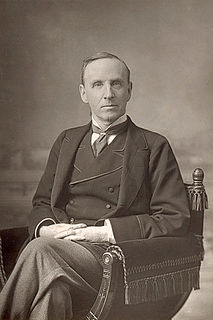A Quote by Alfred North Whitehead
Education is the acquisition of the art of the utilisation of knowledge.
Quote Topics
Related Quotes
If the term education may be understood in so large a sense as to include all that belongs to the improvement of the mind, either by the acquisition of the knowledge of others or by increase of it through its own exertions, we learn by them what is the kind of education science offers to man. It teaches us to be neglectful of nothing - not to despise the small beginnings, for they precede of necessity all great things in the knowledge of science, either pure or applied.
We should not value education as a means to prosperity, but prosperity as a means to education. Only then will our priorities be right. For education, unlike prosperity is an end in itself. .. power and influence come through the acquisition of useless knowledge. . . irrelevant subjects bring understanding of the human condition, by forcing the student to stand back from it.
We do not merely give a religious education because that would seem to imply the possibility of some other education, a secular education, for example. But we hold that all education is divine, that every good gift of knowledge and insight comes from above, that the Lord the Holy Spirit is the supreme educator of mankind, and that the culmination of all education (which may at the same time be reached by a little child) is that personal knowledge of and intimacy with God in which our being finds its fullest perfection.
In the popular arena, one can tell ... that the average man ... imagines that an industrious acquisition of particulars will render him a man of knowledge. With what pathetic trust does he recite his facts! He has been told that knowledge is power, and knowledge consists of a great many small things.
Please don't make the mistake of thinking that the arts and sciences are at odds with one another. That is a recent, stupid and damaging idea. You don't have to be unscientific to make beautiful art or to write beautiful things... science is not a body of knowledge or a belief system, it is just a term that describes humankind's incremental acquisition of understanding through observation. Science is awesome. The arts and sciences need to work together to improve how knowledge is communicated.
We profess to teach the principles and practice of medicine, or, in other words, the science and art of medicine. Science is knowledge reduced to principles; art is knowledge reduced to practice. The knowing and doing, however, are distinct. ... Your knowledge, therefore, is useless unless you cultivate the art of healing. Unfortunately, the scientific man very often has the least amount of art, and he is totally unsuccessful in practice; and, on the other hand, there may be much art based on an infinitesimal amount of knowledge, and yet it is sufficient to make its cultivator eminent.
Each member of society can have only a small fraction of the knowledge possessed by all, and...each is therefore ignorant of most of the facts on which the working of society rests...civilization rests on the fact that we all benefit from knowledge which we do not possess. And one of the ways in which civilization helps us to overcome that limitation on the extent of individual knowledge is by conquering intelligence, not by the acquisition of more knowledge, but by the utilization of knowledge which is and which remains widely dispersed among individuals.








































